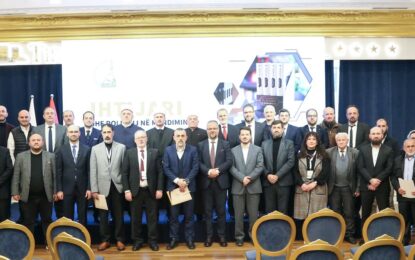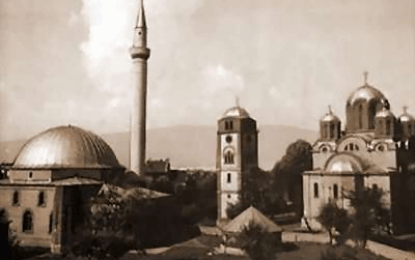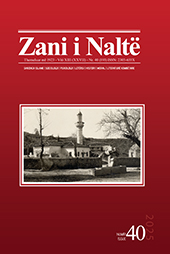Perditësimi i fundit February 26th, 2026 12:14 PM
Te fundit
- PAMJE MAHNITËSE E QELIZËS (QELIZA-SHKENCA DHE KURANI)
- Recension për librin: “Me Zotin mes njerëzve” me autor z. Dorian Demetja
- Zhvillohet konferenca shekncore “Ihtijari dhe roli i tij në mendimin juridik islam”
- Për çfarë shërbejnë universitetet?
- Kushtetuta e vitit 1925 dhe ndikimi i saj në zhvillimet politike dhe juridike në Shqipëri
Abstracts no. 40
Sep 04, 2025 Zani i Nalte English 0
The Concept of the Soul According to Imam Maturidi
Osman Nuri Demir
Abstract
This study explores how Imam Maturidi understands the concept of the soul (rūḥ), viewing it not just as a metaphysical idea, but as a vital and central part of human life and existence. Drawing closely from Qur’anic teachings, Maturidi describes the soul as the source of life—it is what gives the body movement, energy, and purpose. Yet, he is careful not to elevate the soul to a divine status. In his perspective, rūḥ and nafs are two separate components: the rūḥ brings the body to life, while the nafs is what feels, thinks, experiences, and carries moral responsibility—including accountability in the hereafter.
Maturidi’s approach is thoughtful and well-balanced, combining deep theological insight with rational analysis. He clearly separates the role of the Creator from that of the created, and deliberately avoids any explanation that would assign a divine nature to the soul. Throughout his reflections, we find both parallels and clear contrasts with thinkers like Aristotle, Galen, al-Jāḥiẓ, and Ibn Sīnā—revealing a distinct and independent line of thought.
By delving into Maturidi’s view of the soul, this study not only deepens our understanding of human nature in Islamic theology, but also contributes meaningfully to the broader fields of Islamic anthropology and spirituality. It offers valuable bridges between classical tradition and modern intellectual reflection.
Keywords: Imam Maturidi, rūḥ, nafs, life, Qur’an.
Islamic Social Ethics in the Light of Surah al-Hujurat – I
PhD. Hysni Skura – Bedër University, Department of Islamic Studies
Abstract
This paper explores the core dimensions of Islamic social ethics through a close reading of the opening verses (1–10) of Surah al-Hujurat. These verses lay out a rich ethical framework that shapes how individuals relate to divine authority, how they respect the Prophet, verify information, protect human dignity, and avoid harmful behaviors like mockery and gossip. They also emphasize the importance of justice and fostering brotherhood among believers.
Using an interdisciplinary approach that blends classical Qur’anic interpretation with contemporary insights from philosophy, sociology, and psychology, the study shows how the message of the Qur’an offers timeless guidance for ethical living—even in today’s complex world. The Prophet’s establishment of brotherhood in Medina (mu’ākhāt) is presented as a powerful example of how these principles can be put into practice in real social settings.
Ultimately, this study highlights Surah al-Hujurat as a comprehensive ethical blueprint—one that can inspire the creation of a more just, compassionate, and stable society. It reminds us that Islamic faith is not only a matter of belief but also a call to ethical and civic engagement in the modern world.
Keywords: Qur’an, Surah al-Hujurat, Islamic ethics, brotherhood, justice, morality, development
Sociological Reasons for the Emergence and Spread of Religious Fractions in Contemporary Times
PHD. Feim Gashi
Sociology, as one of the most important human sciences, focuses on the study of humans as social beings and the societies in which they live. One of its subfields is the sociology of religion, which examines the interactions between social structures and various religions, identifying aspects such as beliefs, practices, and organizational forms of religious faith through sociological methods and disciplines.
Sacred texts serve as a boundless source of societal insights throughout different historical periods. From this perspective, they are key points of interest for scholars in the sociology of religion. This text explores the sociology of religion and the sociological reasons for the emergence and spread of religious factions in contemporary times.
The sociology of religion analyzes interactions between social structures and religious beliefs, including aspects such as dogmas, cults, and religious practices. The text focuses on several key factors contributing to the formation and spread of religious factions, including the crisis of the family, the search for identity, the need for answers and the sense of being “special,” poverty, and the divide between rural and urban life.
By examining these factors in detail, it is highlighted that religion and religious factions often provide emotional and spiritual support, as well as responses to various social and individual concerns. In conclusion, the text suggests that these factions help individuals create a distinct identity and survive in an ever-changing environment.
Keywords: Fractionalization, Cult, Family, Identity, Religion, Dogma.
Perspectives on Islamic Psychology: al-Raghib al-Isfahani on the Healing of Emotions in the Qur’an
Dr. Yasien Mohamed, Professor of Arabic Studies and Islamic Philosophy at the University of the Western Cape, South Africa.
Abstract
This paper offers a heartfelt and reflective look into how emotions—such as anger, sadness, and fear—are understood and addressed within the Islamic tradition. Drawing on the insights of al-Rāghib al-Iṣfahānī and the emotional wisdom found in the Qur’an, the study explores how Islam speaks to the human experience not only through theology and law, but also through its deep concern for the emotional and spiritual well-being of the individual.
Long before modern psychology began recognizing the power of thought and meaning in shaping our emotional lives, thinkers like al-Isfahānī had already proposed a rich, holistic view of the human being—where the soul, reason, and one’s relationship with God all play a vital role in healing and emotional growth.
In this view, emotions are not flaws to be suppressed, but essential aspects of being human. Anger, when guided by reason and tempered with gentleness, can serve to defend justice and human dignity. Sadness is not just pain—it’s also a window into our losses, our memories, and the deeper questions of life. Even fear—often seen as a sign of weakness—can, through faith, become a path to trust, preparation, and hope.
Rather than seeing the human being as someone broken who simply needs therapy, this study presents a more uplifting view: a person on a journey toward meaning, serenity, and closeness to the Divine. Emotional healing, in this light, doesn’t come only through techniques or external tools, but through an honest return to the self, a renewed connection with the Creator, and a sincere commitment to living with purpose and virtue.
In this sense, the Qur’an is more than a sacred book—it becomes a companion for the troubled soul, offering light in moments of darkness, calm in times of turmoil, and hope for every heart in search of healing.
Keywords: Islamic psychology, al-Rāghib al-Iṣfahānī, emotions in the Qur’an, anger, sadness.
“THE PHILOSOPHICAL CONCEPTS OF AL-FARABI (870–950) AS A FOUNDATION FOR ISLAMIC GEOGRAPHICAL THOUGHT”
M.Sc. Artan S. Mehmeti
Abstract
Al-Farabi, one of the most influential thinkers of the Islamic Golden Age, is renowned not only for the depth of his philosophical thought but also for the wide-ranging impact he had across disciplines such as logic, metaphysics, ethics, politics, music, and cosmology. While he may not have been a geographer in the traditional sense, his theoretical ideas played a significant role in shaping geography as a conceptual and philosophical science in the Islamic world. Through his interdisciplinary approach to understanding the universe, the city, the human being, and nature, Al-Farabi created important bridges between abstract thought and spatial realities. This study explores how his work contributed to the development of geo-spatial thinking by examining the theoretical frameworks he established—frameworks that later became foundational for scholars working in geography, urban studies, and natural philosophy.
FREEDOM OF THOUGHT, CONSCIENCE, AND RELIGION IN THE CONTEXT OF FUNDAMENTAL RIGHTS
Assoc. Prof. Dr. Saimir SHATKU
University of Tirana
Abstract
This paper explores the meaning and legal interpretation of Article 9 of the European Convention on Human Rights (ECHR), which protects freedom of thought, conscience, and religion. It connects these rights with key provisions of the Albanian Constitution—namely Articles 3, 9, 10, and 24—and offers a thoughtful analysis of how these fundamental freedoms are understood and applied in a democratic and pluralistic society.
The study looks closely at the legal and philosophical challenges that arise when religious freedom intersects with other important social interests, such as maintaining public order, protecting the rights of others, and promoting equality. It also examines how principles like secularism and pluralism are reflected in the Albanian legal system and how the case law of the European Court of Human Rights (ECtHR) has shaped national judicial practices and public policy.
Adopting a comparative and systematic approach, the paper seeks to highlight the delicate balance between individual freedoms and collective responsibilities. It offers practical recommendations for improving the legal framework and ensuring that these rights are upheld effectively in practice. Ultimately, this study contributes to the wider legal and academic debate by stressing the need for a flexible and context-aware interpretation—one that honors cultural and religious diversity while safeguarding the core values of democracy and human rights.
Keywords: Freedom of religion, freedom of thought, European Convention on Human Rights, Albanian Constitution, European Court of Human Rights.
The 1925 Constitution and its Impact on Political and Legal Developments in Albania
Assoc. Prof. Dr. Ilirjana Kaceli, Department of History, “Luigj Gurakuqi” University of Shkodra
Abstract
The Constitution of 1925 represents a key turning point in Albania’s political and legal evolution, marking the transition from a princedom to a republican form of government during a period of fragile state-building. This paper takes a closer look at the content of the Constitution, focusing on how it structured the presidential republic, defined the powers of the President, and limited the roles of both the legislative and judicial branches.
A central theme of the study is how the Constitution was used to legitimise Ahmet Zog’s rise to power and paved the way for a highly centralised and increasingly authoritarian system. It also considers the Constitution’s role in reshaping Albania’s legal framework—moving away from the legacy of Ottoman law and aligning more closely with Western legal traditions as part of broader modernisation efforts.
Using an interdisciplinary approach, the paper examines both the immediate and long-term effects of the 1925 Constitution on Albania’s political and legal landscape. By doing so, it sheds light on the complex processes of institutional development that took place in Albania during the 1920s.
Keywords: 1925 Constitution, Republic, Senate.
What Are Universities For?
Nuredin Nazarko
Abstract
In today’s fast-changing world—where technology and labor market demands increasingly shape higher education—there is a growing need to rethink what universities are really for. This text is a thoughtful reflection on the role of higher education, not just in training competent professionals, but in helping shape individuals with integrity, moral sensitivity, and a broad, thoughtful view of the world.
Drawing inspiration from the critical thinking of Ziauddin Sardar and Jeremy Henzell-Thomas, the text argues that universities cannot limit themselves to being job-training centers. They must also be places where knowledge is nurtured, values are cultivated, and humanity is at the heart of learning.
The piece raises important questions: Is education helping people understand themselves, their purpose, and their place in the world? Or is it pushing them toward an empty existence, where success is measured only by material gain? The authors suggest a return to the essence: to knowledge that encourages deep thinking, to values that build character, and to a new model of education that puts the human spirit at its center.
This analysis is not just a critique of the current system—it’s also a call to action. It urges us to pursue genuine, organic reform that starts from within universities and is led by committed educators and scholars. Only then can universities truly regain the trust of society and help shape a new generation—one that seeks not just to know, but also to understand, to feel, and to act with justice.
Keywords: higher education, university, crisis of knowledge, educational paradigm.
In Memory of Dr. Rexhep ef. Boja (20 June 1946 – 14 September 2021)
Resul Rexhepi
We have now entered the fourth year since the passing of Dr. Rexhep ef. Boja—a beloved imam, teacher, scholar, community leader, and diplomat of Kosovo—who left this world for the Hereafter.
On this occasion, I feel compelled to share a few reflections, memories, and biographical notes about a man whose life and legacy continue to inspire. I am certain that much more will be written and said about Dr. Boja in the years to come, because his contribution was vast, meaningful, and consistently rooted in service—to both his faith and his homeland.
I had the honor—and truly consider it a privilege—to have worked alongside Dr. Boja, often during extremely sensitive and difficult times.
My connection with him began back in 1985. That year, in issue no. 42 of the journal Edukata Islame (Islamic Education), I published a short biographical piece titled “When Ambitions Are Crowned with Success.” The article marked a significant moment in his life—his successful completion of a doctorate at the Islamic University of Medina.
A year later, in 1986, during my time as director of the “Alauddin” Madrasa, we were honored to welcome Dr. Boja as a lecturer in Islamic jurisprudence (fiqh). A few years later, he moved on to lead the Islamic Community of Kosovo, a position he held until 2003. From there, he continued to serve as a professor at the Faculty of Islamic Studies in Pristina. Since the founding of the faculty in 1992, he served not only as dean but also as a devoted teacher of fiqh and da‘wah (Islamic outreach).
When thinking about Dr. Rexhep ef. Boja’s life, I believe it’s important to see it as a journey of service through many roles and phases: starting as an imam at the “Red Mosque” in Peja, later as a professor at the “Alauddin” Madrasa, then as a leader and educator at the Faculty of Islamic Studies, followed by his role as Mufti of the Islamic Community of Kosovo, and finally, as a diplomat representing our country on the international stage.
His path was marked by dignity, wisdom, and a tireless commitment to the well-being of his people and the values he upheld. Dr. Rexhep ef. Boja left behind a legacy that will continue to guide and inspire future generations.
THE ISLAMIC HISTORY OF THE NEW WORLD
Paul Lunde
Abstract
This article explores a little-known but profoundly meaningful chapter of Islamic history: how the Ottoman Empire intellectually responded to the discovery of the New World. Although the Ottomans did not take part directly in the colonial expeditions of the 15th and 16th centuries, figures such as Piri Reis and Ali ibn Husayn demonstrate that this “New World” did not go unnoticed. Through maps, nautical books, and geographic writings, they sought to understand what was happening across the ocean—not as conquerors, but as scholars, sailors, and keen observers.
At the heart of this reflection lies the rare Ottoman work Tarih-i Hind-i Garbi—an attempt by a 16th-century Ottoman scholar to describe the New World through the lens of Islamic thought. The work blends European sources with classical Islamic legends, offering a vision that is at times mythologized, yet rich in effort and intent to comprehend. Through this and other works such as Kitab-i Bahriye and Muhit, the reader witnesses how Muslim scholars approached the unknown—not with fear, but with curiosity, imagination, and a deep commitment to knowledge.
In a rapidly changing world, these authors represent an alternative way of engaging with global history—not through domination, but through the pursuit of understanding. This article highlights not only their valuable contributions, but also the fact that, even in silence, Ottoman thought formed an important part of the broader Islamic cultural response to the modern age of discovery.
Keywords: Ottoman Empire, Piri Reis, Ali ibn Husayn (Katib-i Rumi), New World, Geographical Discoveries, Ottoman Cartography.
Artikuj të ngjashëm
-
 PAMJE MAHNITËSE E QELIZËS...
PAMJE MAHNITËSE E QELIZËS...Feb 26, 2026 0
-
 Recension për librin: “Me Zotin mes...
Recension për librin: “Me Zotin mes...Feb 09, 2026 0
-
 Zhvillohet konferenca shekncore...
Zhvillohet konferenca shekncore...Jan 15, 2026 0
-
 Për çfarë shërbejnë universitetet?
Për çfarë shërbejnë universitetet?Oct 09, 2025 0
Me shumë në këtë kategori
-
 Abstracts no. 39
Abstracts no. 39Jun 25, 2025 0
-
 Abstracts no. 38
Abstracts no. 38Jul 02, 2024 0
-
 Abstracts no. 37
Abstracts no. 37May 07, 2024 0
-
 Abstracts no. 36
Abstracts no. 36Feb 12, 2024 0
Aktivitete
Jan 15, 2026 0
Kjo konferencë u organizua në ambientet e “Tirana International Hotel”, me rastin e botimit të kolanës “El-Ihtijaru li Ta’lili-l-Muhtari”, botim ky i cili vjen si bashkëpunim...Studime
May 21, 2025 0
Abstrakt Ky punim trajton një nga temat më komplekse dhe të diskutueshme në studimet e Kur’anit: “El-Huruf el-Mukatta’a” (shkronjat e ndërprera) që shfaqen në fillim të 29...Gjuhë-letërsi
May 21, 2025 0
Nuredin Nazarko Abstrakt “Konak me Edisonin” është një reflektim filozofik-letrar që eksploron përmasat ekzistenciale të jetës njerëzore përmes një udhëtimi meditativ...Sociologji
Sep 04, 2025 0
Dr. Feim Hoxha ABSTRAKTI Sociologjia, si një nga shkencat më të rëndësishme humane, ka në fokus të studimeve të saj njeriun si një qenie sociale, si dhe shoqërinë në të cilën...




















